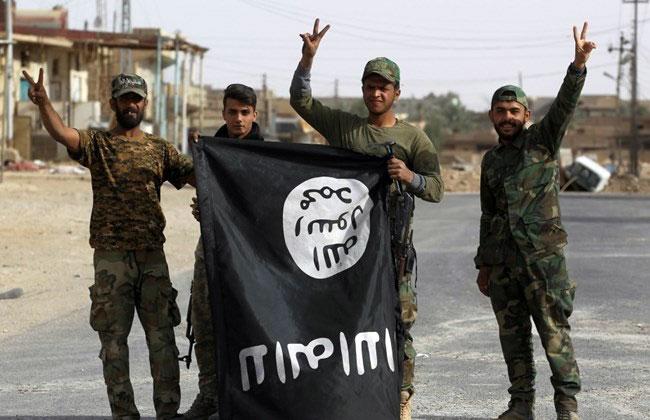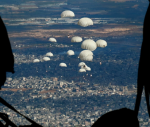You are here
Iraq, a rocky year since Daesh declared defeated
By AFP - Dec 10,2018 - Last updated at Dec 10,2018

Iraqi members of the Popular Mobilisation Unit carry Daesh flag upside down Al Qaim, Iraq, on November 3, 2017 (AFP photo)
BAGHDAD — The year since Iraq declared victory over Daesh terrorists in December 2017 has been a rocky one for the political divided and war-ruined country.
Here are some of the key events.
'Sleeper cells'
On January 15the prime minister, Haider Al Abadi, says terrorist "sleeper cells" remain and must be eliminated.
His comments come after a twin suicide bombing kills 31 people in Baghdad in the second such attack in three days.
On February 19 Daesh fighters disguised as soldiers kill 27 members of a pro-government paramilitary group, Hashed Al Shaabi, underlining the threat still posed by the militants.
Moqtada Sadr shock poll win
On May 12 Iraq holds parliamentary elections, with firebrand Shiite cleric Moqtada Sadr achieving a shock triumph.
Sadr's militia is known for a bloody insurgency against US troops who invaded in 2003 to oust long-time dictator Saddam Hussein.
In an alliance with communists, Sadr's group takes 54 seats. The Conquest Alliance of pro-Iranian former paramilitary fighters comes second with 48 seats. Abadi's bloc is third with 42.
Terrorists hanged
On June 3 a court sentences a French woman to life in jail for membership of Daesh. She is among more than 300 people, including around 100 foreigners, sentenced to death or life in prison on the same charges, judicial sources say.
On June 29, 13 terrorists on death row are executed in retaliation for the killing of eight civilians who had been held captive by Daesh.
Protests erupt
On July 8 dozens of people protest against unemployment in the port city of Basra. Violent demonstrations spread to other parts of the country, demanding jobs and condemning corruption among officials.
Over a week in early September, 12 protesters are killed in Basra in clashes with security forces.
On September 3 — four months after the elections — the groupings of Sadr and Abadi agree to work with others to create the biggest bloc in parliament capable of forming a new government.
But on September 8 Sadr drops his support for Abadi as anger grows over the Basra killings.
Political divisions
On September 15 parliament elects a speaker in a major step towards forming a long-delayed government.
Speaker Mohammed Al Halbusi is a Sunni, in line with a long established power-sharing deal in which the prime minister must be a Shiite and the president a Kurd.
On October 2 the parliament selects Barham Saleh as president, a largely ceremonial role. He instructs independent Adel Abdel Mahdi to form a government as prime minister designate.
On October 5 the parliament approves Mahdi's 14 proposed cabinet ministers but key portfolios are not assigned because of political divisions.
First attack on Mosul
On November 8 a car bomb kills at least three people in Mosul in the first such attack in the city — which had been the de facto Daesh capital in Iraq for nearly three years — since terrorists were ousted there in July 2017.
The Centre for Strategic and International Studies says that while the total number of Daesh attacks in Iraq has dropped in 2018, those against government targets have increased.
On the anniversary of the declared Daesh defeat, Mahdi says on December 10 the next target is corruption.
The government meanwhile announces it will reopen part of Baghdad's high-security Green Zone, where key government offices and Western embassies are based, for five hours every evening. It has been closed off to the general public since 2003.
Related Articles
BAGHDAD — Iraq's prime minister on Thursday called on the Iraqi people to prioritise the battle against the Daesh terror group amid a deepen
BAGHDAD — Tension between Iraq's Shiite leaders mounted on Sunday as the toll from protests in central Baghdad on Saturday increased to six
BASRA, Iraq — After several nights of deadly protests, calm returned to the southern Iraqi city of Basra on Sunday, even as residents stuck

















